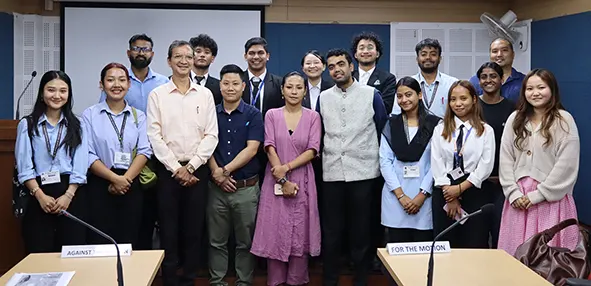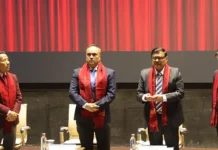RONO HILLS, 31 Oct: As part of the APLA@50 Outreach Connect, a debate competition was held on the motion ‘Implementing one nation, one election (ONOE) streamlines the electoral process’ at Rajiv Gandhi University (RGU) here on Wednesday.
The event brought together students from the Arunachal Law Academy, Arunodaya University, Hills College of Teacher Education, and RGU, who showcased exceptional oratory skills, critical reasoning, and in-depth understanding of the topic.
Participants for the motion passionately argued that implementing ONOE would lead to a significant reduction in election expenditure and administrative burden, while also minimising the number of days required for the electoral process.
They highlighted that having the model code of conduct enforced only once every five years would enhance governance efficiency and reduce the stress on election personnel, who are currently deployed repeatedly for different elections.
On the other hand, participants against the motion questioned the rationale of limiting the democratic process to a mere financial cost-benefit analysis. They argued that simultaneous elections could undermine regional narratives, dilute local issues, and distort the democratic fabric by shifting the focus towards national-level agendas at the expense of state and regional concerns.
The rebuttal round was particularly engaging, marked by strong cross-questioning and persuasive counterarguments, reflecting the participants’ keen understanding of both constitutional and political nuances surrounding the topic.
The competition was judged by an eminent panel comprising RGU’s English Department Head (i/c) Prof Miazi Hazam, Law Department Assistant Professor Dr Samir Bhadury, and RGU’s Centre for Distance and Online Education Assistant Professor Dr Pasang Ruku.
Prof Hazam commended the participants for their data-backed arguments and informed perspectives, praising their enthusiasm and clarity of thought.
Dr Bhadury also appreciated the constitutional awareness reflected in the deliberations and congratulated the participants for maintaining the spirit of intellectual debate.
Dr Ruku remarked that the session felt like a parliamentary debate in action, where passionate voices argued as if legislating a real bill. He emphasised that such discussions play a crucial role in helping citizens and students alike form informed opinions on important national policies.
Institution-level prizes for all four participating colleges were declared at the end of the event.
The winners of this competition will advance to the state-level mega debate competition scheduled to be held on 25 November at RGU, where they will once again engage in a battle of ideas and intellect.



